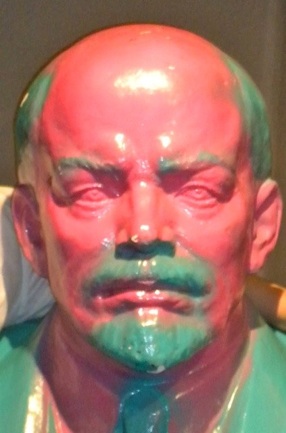Cold War Treasure Chest - The Wende Museum

Did you know that the biggest archive of Cold War artifacts is in Los Angeles? Only a colorful piece of the Berlin Wall in front of the main entrance hints at the hidden treasure inside a nondescript office building. Personal documents, photos, flags, uniforms, paintings, Vladimir Lenin busts, spy equipment, toys, films, dishes, scrap books, furniture, newspapers, communist street signs - more than 70 thousand items fill three story shelves in a warehouse like basement.
This is the Wende Museum.
“Wende” is the German word for “turning point”. We Germans use it to refer to the collapse of East Germany in 1989 and the creation of the reunified Germany. The Genius behind the Wende Museum is L.A.-native Justin Jampol. A young historian studying in Oxford Justin traveled to Germany after The Wall came down and was terrified to see how many historical objects from the Cold War area were sold for little money, discarded, burned or found their way into landfills or cheap flea markets.
So Justin started collecting. His collection eventually grew too big for his apartment, friends’ apartments, garages, attics and containers. He could not find a German museum to support his unusual treasures so Justin turned to Los Angeles - where old and new acquaintances were very interested in his discoveries.
Justin secured storage room in the basement of an office building and funds for moving his collection. In 2002 he opened the Wende Museum and Archive of the Cold War. It has grown ever since.
In the year of the museum’s tenth anniversary Justin still enthusiastically opens boxes with donations or recent purchases shipped from countries in Eastern Europe or the former Soviet Union to Los Angeles. He still gets excited talking about any object of the collection whether it is bizarre like a hand painted flag of the communist party of Afghanistan, fun like menus from GDR-restaurants or educational as films by the Hygiene Museum in Dresden. These movies are part of an expansive audiovisual collection from the German Democratic Republic which will now be catalogued, digitized and made accessible to the public thanks to a Grant by The Institute of Museum and Library Service. The ultimate goal is to put 6500 films, 10 thousand slides and audio recordings online, available free of charge to anyone everywhere in the world.
It seems to be odd that a museum of this kind exits in Los Angeles but what may have been a compromise in the beginning turned out to be the perfect location. The distance from political debates about the former Eastern bloc attracts independent research and even helps to acquire artifacts that might otherwise have been destroyed because of emotional or political baggage.
Justin and his museum collaborators show visitors, scholars, researchers and artists whatever they are interested in - from sex-education movies, a suitcase that can be used as a chair and a golden sword signed by Saddam Hussein to handwritten notes from prison by the former leader of East Germany Erich Honecker.
Go visit, ask for a tour and see for yourself!
